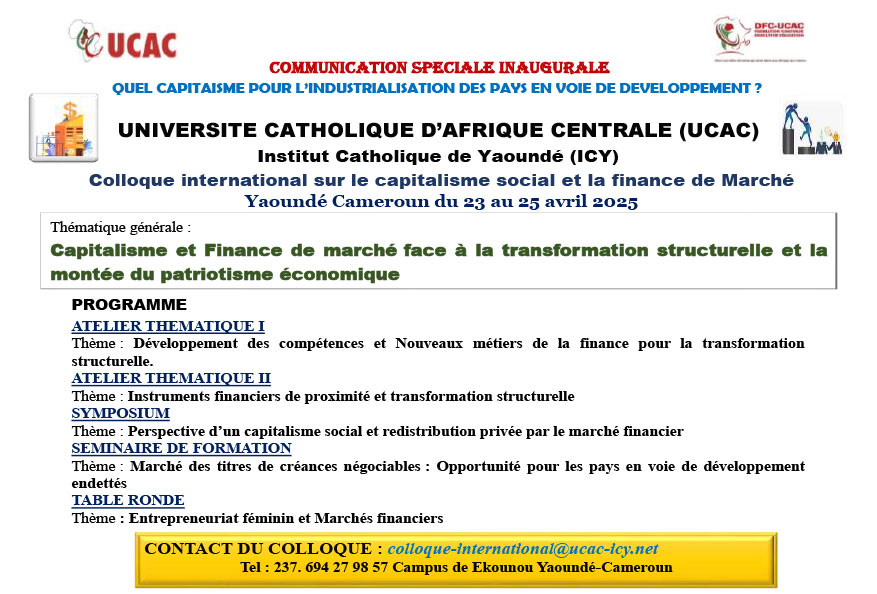
COLLOQUE INTERNATIONAL SUR LE CAPITALISME SOCIAL ET LA FINANCE DE MARCHÉ (APPEL A COMMUNICATIONS)
UNIVERSITE CATHOLIQUE D’AFRIQUE CENTRALE (UCAC)
Institut Catholique de Yaoundé (ICY)
CONSEIL SCIENTIFIQUE DE L’UNIVERSITE CATHOLIQUE D’AFRIQUE CENTRALE
Colloque international sur le capitalisme social et la finance de MarchéDu 23 au 25 avril 2025 à Yaoundé Cameroun |
APPEL A COMMUNICATIONS
Thème du colloque :
Capitalisme et Finance de marché face à la transformation structurelle et la montée du patriotisme économique
Adresse du colloque : colloque-international@ucac-icy.net
CONTEXTE ET JUSTIFICATION |
Contexte
L’Afrique centrale en particulier et le pays en voie de développement en général sont confrontés à des défis socio-économiques majeurs, notamment la pauvreté, les inégalités, le faible développement du secteur privé et une intégration limitée dans l’économie mondiale. Malgré d’abondantes ressources naturelles et un potentiel démographique important, ces pays peinent à assurer une croissance économique inclusive et durable ou une véritable industrialisation. Le développement d’un secteur financier robuste et d’un capitalisme capable de générer de la richesse et de réduire la pauvreté est crucial.
Traditionnellement, les approches de développement en Afrique centrale ont souvent privilégié des modèles de croissance extractifs, axés sur l’exploitation des ressources naturelles, sans suffisamment prendre en compte la transformation ou les dimensions sociales et environnementales. Cependant, un consensus croissant se dégage sur la nécessité d’un modèle de développement plus inclusif et durable, conforme à la politique de transformation structurelle, intégrant les principes du capitalisme social. Ce modèle met l’accent sur la création de valeur partagée, la responsabilisation sociale des entreprises, et l’inclusion des populations dans le processus de développement économique.
Parallèlement, le développement des marchés financiers en Afrique centrale est encore limité, entravé par un manque d’infrastructures, une faible gouvernance et une faible littératie financière. Une finance de marché dynamique et efficiente est pourtant essentielle pour soutenir la croissance économique, attirer les investissements étrangers et financer les PME, moteurs essentiels de l’import substitution.
Le lien entre un capitalisme social et le développement d’une finance de marché efficiente en Afrique centrale est complexe et mérite une analyse approfondie. La mobilisation des financements pour l’industrie locale, les entreprises socialement responsables, l’impact des investissements sur le développement local, la promotion des instruments et l’influence des institutions financières sur la gouvernance d’entreprise sont autant de questions cruciales qui nécessitent une réflexion collective.
Justification
Ce colloque international vise à rassembler des universitaires, des experts, des chercheurs, des décideurs politiques, des professionnels et acteurs de la finance de marché pour explorer les perspectives d’un capitalisme social porté par la finance de marché en Afrique centrale et dans les pays en voie de développement.
Longtemps dominé par le mercantilisme et la rémunération du capital, le modèle capitaliste fait face actuellement à une critique à cause de la guerre économique ambiante. Celle-ci se manifeste à travers la résurgence du patriotisme économique qui meuble désormais les politiques publiques orientées vers la transformation structurelle des économies et l’import substitution pour les pays en voie de développement d’une part et la réindustrialisation dans les pays développés d’autre part. Cependant, cette dynamique avec la finance de marché, devrait préserver la liberté des échanges et l’économie de marché et faire de l’entreprise un élément important dans la mobilisation et l’allocation des ressources, ainsi que de la redistribution des richesses. L’entreprise devenant alors une exploitation industrielle et un outil du système financier. Car dans le capitalisme l’entreprise est le meilleur outil de redistribution privé. Ainsi, pour les pays en voie de développement, la transformation structurelle de l’économie serait d’abord un changement de politique. Et le changement de politique reposerait sur un ensemble de compétence offertes par la formation, des outils financiers de proximité et un changement de paradigmes comportementaux. Ce qui établirait un nouvel ordre économique et financier qui implique le renouvellement du capital humain, le développement des pratiques sur les marchés et l’évolution de la pensée sur le capitalisme.
Objectifs
Le colloque aura comme vocations principales de :
- Analyser les modèles de capitalisme social : Identifier les bonnes pratiques et les obstacles au développement d’un capitalisme social inclusif et durable.
- Examiner le rôle de la finance de marché dans la promotion du capitalisme social : Explorer comment les marchés financiers peuvent soutenir l’industrialisation et promouvoir l’investissement et la transformation structurelle.
- Identifier les leviers et les obstacles au développement des marchés financiers en Afrique centrale : Analyser les facteurs qui limitent le développement des marchés financiers et proposer des solutions pour les surmonter.
- Promouvoir le dialogue et l’échange d’expériences : Faciliter le partage de connaissances et de bonnes pratiques entre les différents acteurs concernés.
- Formuler des recommandations politiques : Proposer des recommandations politiques concrètes pour promouvoir l’import substitution et une finance de marché plus dynamique.
- Accompagnement des politiques publiques : Elaborer un cadre général d’accompagnement de la politique de transformation structurelle de l’économie et d’import substitution.
- Contribuer au débat académique : Enrichir le débat scientifique sur le développement économique et financier en Afrique.
Ce colloque contribuera à une meilleure compréhension des enjeux de la transformation structurelle de l’économie et une croissance inclusive et durable dans les pays en voie de développement et proposer des stratégies innovantes pour promouvoir un capitalisme inclusif et une finance de marché plus efficiente au service du développement social.
La réflexion autour des thématiques devrait obéir à une approche pluridisciplinaire sur la formation en finance, la professionnalisation sur les instruments financiers de proximité et la construction d’un nouveau modèle capable d’éradiquer l’exclusion économique et les inégalités sociales engendré par le capitalisme. Elle réunira donc des universitaires, des professionnels des marchés financiers et le monde de la recherche. Organisé sous la thématique générale « Capitalisme et marchés financiers face à la transformation structurelle et la montée du patriotisme économique » le développement des travaux se déroulera sur deux ateliers thématiques et un symposium sur les perspectives d’un capitalisme social et redistribution privée par le marché financier.
CONSIGNES DE SOUMISSION DES COMMUNICATIONS |
Les propositions de communication doivent être soumises exclusivement par l’adresse mail : colloque-international@ucac-icy.net au plus tard fin février 2025.
Pour cela, toute communication doit être en format Word comportant respectivement les mentions suivantes :
Communication au colloque
- Nom et prénom
- Filiation
- Institution
- Langues de communication (Français/anglais)
- Titre de votre communication
- Résumé de 100 mots avec une marge de 20 mots au plus
- 4 à 6 mots clés
La présentation des communications issues de recherches empiriques ou de revues systématiques doit comprendre :
- Le problème de recherche
- L’objectif ou hypothèse de recherche/ Contexte
iii. La méthodologie (Méthode de recherche, participants, technique et taille d’échantillon, stratégie d’analyse de données)
- Principaux résultats en lien avec l’objectif ou l’hypothèse
- Conclusion
La présentation des communications issues des réflexions doit comprendre :
- Introduction
- Éléments de la problématique/ Contexte
iii. Objectif
- Brève présentation des grandes idées développées
- Conclusion
Toute communication est soumise à :
- respecter des normes de présentation des écrits scientifiques ;
- soumission d’un résumé ne constitue pas une communication pour le colloque ;
- en l’absence de l’auteur principal, un coauteur peut assurer la présentation, à condition de s’être acquitté des droits d’inscription ;
- un auteur peut soumettre plusieurs communications ;
- seuls les résumés, dont au moins un auteur ou coauteur a payé les frais d’inscription, seront inclus dans le programme du colloque.
En cas d’acceptation d’une proposition de communication, les auteurs qui désirent publier leur travail dans les actes du colloque doivent déposer le texte complet de l’article au plus tard à la date de début du colloque.
NB : Les soumissionnaire reçoivent dans leur boite email un courriel de notification de réception de leur soumission.
THEMATIQUES DES TRAVAUX |
Atelier thématique 1
Thème : Développement des compétences et métiers de la finance pour la transformation structurelle des économies.
Axes de recherche : Identifier et présenter l’ensemble des compétences et métiers sur les marchés financiers. Proposer des axes de formations professionnelles pour l’accompagnement des politiques de transformation structurelle dans la CEMAC et les pays en voie de développement.
Note thématique
Comme nouvelle approche des politique publiques, la transformation structurelle se caractérise par la croissance des entreprises, l’élargissement des marchés, l’apport des technologies et la réorientation stratégique. Selon l’étude de Klinger et Lederman, la transformation structurelle est définie comme la réallocation progressive et soutenue des ressources des secteurs d’activité économique les moins productifs vers les plus productifs. Ainsi, les transformations économiques peuvent se faire de manière transversale à l’exemple du basculement des échanges sur les produits dits trade in goods vers les échanges sur les tâches dits trade in tasks. Celle-ci peut encore se faire à travers les chaines de valeur comprises comme une transformation des structures de production et de consommation, mais aussi, de la transformation de la structure de financement. Complétant ainsi la définition de Klinger et Lederman par une mobilisation des ressources endogènes qui précède leur allocation. Ainsi, la transformation structurelle serait alors la modification stratégique de la mobilisation et l’allocation des ressources vers l’industrialisation, la production et la consommation. On devrait donc assister à un déplacement des économies des activités à faible productivité et à forte intensité de main-d’œuvre vers des économies à plus forte productivité et à forte intensité de capital et de compétences. Le développement de bonnes compétences au bon moment et au bon endroit dépend alors de la formation universitaire et professionnelle. Ces institutions respectives devraient s’approprier le processus et mettre à la disposition de l’économie des compétences nécessaires à la transformation économique.
Intervenants : Trois intervenants nationaux et internationaux
Modérateur :
Profils : Enseignants du supérieur, Experts des cabinets de formation.
Atelier thématique 2
Thème : Instruments financiers de proximité et financement de la transformation structurelle des économies.
Axes de recherche : Proposer un cadre développement des instruments financiers de proximité sur les marchés financiers permettant de financer l’investissement, la production et la consommation pour la transformation structurelle. Faire des instruments financiers d’épargne et de la dette des outils d’inclusion économique et d’inclusion financière.
Note thématique
La politique de substitution des importations fait appel à plusieurs autres concepts dans le positionnement stratégique des nations. Face à la globalisation et à la prédation quelle entraine, les politiques publiques sont à la recherche d’un minimum de protection des citoyens, ainsi que leur épanouissement économique dont les supports sont le patriotisme économique, le nationalisme économique et la politique d’import substitution. Comme engagement stratégique, l’import substitution modifie la structure économique par le remplacement des produits étrangers avec la production nationale. Ce qui limite la prédation véhiculée par le capitalisme et sa doublure le libre-échange.
Les pays en voie de développement qui sont orientés vers leur industrialisation devraient promouvoir en interne une dynamique de production nationale. L’import substitution permet à ceux-ci de produire eux-mêmes ce qu’ils importent et de gagner en indépendance. Pour cela il est nécessaire de disposer d’un marché intérieur de production, de consommation et surtout de développer des instruments financiers de proximité pour un financement endogène. Le caractère extraverti des économies des pays en voie de développement rend ces derniers plus vulnérables face à la mondialisation et au libéralisme. Dès lors la transformation structurelle ne sera pas seulement le remplacement des importations par la production locale, mais aussi, la substitution des capitaux étrangers par des financements endogènes. Avec ceux-ci le patriotisme économique, le nationalisme économique et l’intelligence économique auront une prépondérance dans les politiques publiques. Les pays en voie de développement sont appelés à mobiliser des instruments financiers de proximité notamment sur l’épargne et la dette par les marchés financiers pour le financement de la transformation structurelle et assurer à la fois une inclusion économique par la participation populaire sur les marchés primaires et une inclusion financière par l’accès au profit sur les marchés secondaires.
Intervenants : Trois intervenants nationaux et internationaux
Modérateur :
Profils : Enseignants du supérieur, Professionnels des marchés financiers, Experts Financiers.
SYMPOSIUM
Thème : Perspective d’un capitalisme social et redistribution privée par le marché financier
Objectifs : Poser un diagnostic fondamental sur l’émergence d’un nouveau modèle économique équilibré autour du capitalisme. Proposer les bases d’un capitalisme humanitaire et la dynamique d’une socialisation des profits financiers par une redistribution privé à travers les marchés financiers. Construire une relation entre le capitalisme sociale et la conceptualisation d’une économie faite par le citoyen et pour le citoyen.
Axes de recherche
L’ordre social économique au cours des siècles est un héritage de l’ordre social politique qui se caractérise par la prééminence incontestable de l’Etat. Ainsi, les politiques sociales, culturelles et économiques partent de l’Etat aux citoyens et autres acteurs. Cette structuration fait de l’Etat le régulateur et le stratège pour l’ensemble des programmes et l’action économiques. Le libéralisme sous la forme du désengagement de l’Etat des secteurs productifs n’a pas permis de sortir les économies des pays en voie de développement des financements institutionnels, qui plombent leur industrialisation. Le potentiel industriel présent dans ces pays reste donc peu ouvert au marché des capitaux directs, ayant pour conséquence une forte institutionnalisation de la structure industrielle. L’Etat a alors le rôle exclusif d’assurer la répartition et la redistribution verticale et horizontale des richesses. Ainsi, le capitalisme est resté sur ses principaux piliers que sont : la propriété privée ; l’intérêt personnel ; l’entreprise privée et la liberté de marché, confinant le libéralisme aux institutions publiques. Par une avancée de la pensée sur le capitalisme, la dynamique du marché imposerait un ordre social économique qui modifie la structure économique partant du marché (citoyen) pour l’Etat et de l’Etat pour le marché (citoyen). L’Etat est dans cette organisation un régulateur accompagné par le marché dans la recherche et la redistribution du profit collectif qui limite l’ultra libéralisme et ses effets pervers. Du marché naitrait alors non seulement une participation populaire, mais aussi, un capitalisme utilitaire intégrant des valeurs majoritaires de solidarité dans les relations économiques, une participation populaire à la production, une consommation de masse et une redistribution privée des richesses disponibles à la communauté entière. Le capitalisme non seulement reposerait sur le profit, mais devrait se soucier des améliorations sociales. Il se dessine donc la perspective d’une évolution fondamentale vers un capitalisme social dont la recherche est appelée à poser les bases du modèle.
Intervenants : Trois intervenants nationaux et internationaux
Modérateur :
Profils : Enseignants du supérieur, Chercheurs, Experts financiers.
Bibliographie
- Henri Sée. Quelques aperçus sur le capitalisme commercial en France au xviie siècle. Revue d’histoire économique et sociale, pp. 165 à 180 (16 pages) Publié par Armand Colin Vol. 12, No. 2. 1924.
- Laurent Batsch. Le capitalisme financier. Ed. REPERES novembre 2002.
- Grace Lumpkin, Alice Béja. Notre règne arrivera, Aux forges de Vulcain 2011
- Viviane Forrester. Dictature du profit Le Livre de Poche 2001
- Klinger et Lederman, Etude. 2004
- Naomi Klein. Tout peut changer : Capitalisme & changement climatique, Actes Sud 2015
- Eric Delbecque. Quel patriotisme économique, 2008
- Marie-Françoise DELAITE et Jacques POIROT. Patriotisme économique et développement durable, Vol 3. 2010
- Léo PASVOSLSKY. Economic Nationalism of the Danubian State, 1928
- Alain VERHAEGEN et Robert Williame. Indépendance politique et dépendance économique, Economie appliquée. 1971
- Harold Wilensky. L’intelligence organisationnelle, 1967
- Charles ETOUNDI, Ingénierie d’émission boursière et investissements financiers Guide pratique pour les investisseurs et les émetteurs. Ed Le Kilimandjaro. 2024
- Charles ETOUNDI, Économie citoyenne esquisse de modèle et enjeux post fusion de la bourse des valeurs mobilières de l’Afrique centrale Fonction redistribution du Marché financier. Ed Le Kilimandjaro. 2024
Comité scientifique
Président : Pr TACHOUOLA Vincent
Membres :
- Pr Abbé Thomas Bienvenue TCHOUNGUI
- Pr MENGUE Marie Thérèse
- Pr LEKA ESSOMBA Armand
- Pr NKOULOU NKOULOU Zozo
- Pr Fatimatou MOUNSADE
- Pr PROVENZANO Patrick
- Dr NDZOMO BESSALA Pierre Yves
- Dr SAA LAPA Achille Adephe
Contact :
Charles ETOUNDI Chef de projet
Coordonnateur du Centre de recherche
Tél : (237) 694 27 98 57 mail : charles.etoundi@ucac-icy.net
TOUJOURS AU PROGRAMME
| TABLE RONDE
Thème : Femmes entrepreneurs et Marchés financiers |
| SEMINAIRE DE FORMATION
Thème : Marché des titres de créances négociables : Opportunité pour les pays endettés, cas des pays en voie de développement |
| COMMUNICATION SPECIALE INAUGURALE
Quel capitalisme pour l’industrialisation des pays en voie de développement ? |
CATHOLIC UNIVERSITY OF CENTRAL AFRICA (UCAC)
Catholic Institute of Yaoundé (ICY)
SCIENTIFIC COUNCIL OF THE CATHOLIC UNIVERSITY OF CENTRAL AFRICA
INTERNATIONAL CONFERENCE ON SOCIAL CAPITALISM AND MARKET FINANCE
From April 23 to 25, 2025 Yaoundé Cameroon
CALL FOR PAPERS
Theme of the conference:
Capitalism and market finance facing structural transformation and the rise of economic patriotism
Adress : colloque-international@ucac-icy.net
CONTEXT AND JUSTIFICATION
Context
Central Africa in particular and the developing country in general face major socio-economic challenges, including poverty, inequality, weak private sector development and limited integration into the global economy. Despite abundant natural resources and significant demographic potential, these countries struggle to ensure inclusive and sustainable economic growth or true industrialization. The development of a robust financial sector and capitalism capable of generating wealth and reducing poverty is crucial.
Traditionally, development approaches in Central Africa have often favored extractive growth models, focused on the exploitation of natural resources, without sufficiently taking into account transformation or social and environmental dimensions. However, a growing consensus is emerging on the need for a more inclusive and sustainable development model, in line with the policy of structural transformation, integrating the principles of social capitalism. This model emphasizes the creation of shared value, corporate social responsibility, and the inclusion of populations in the economic development process.
At the same time, the development of financial markets in Central Africa is still limited, hampered by a lack of infrastructure, weak governance and low financial literacy. Dynamic and efficient market finance is nevertheless essential to support economic growth, attract foreign investment and finance SMEs, essential drivers of import substitution.
The link between social capitalism and the development of efficient market finance in Central Africa is complex and deserves in-depth analysis. The mobilization of financing for local industry, socially responsible companies, the impact of investments on local development, the promotion of instruments and the influence of financial institutions on corporate governance are all crucial issues that require a collective reflection.
Justification
This international conference aims to bring together academics, experts, researchers, policy makers, professionals and players in market finance to explore the prospects of social capitalism driven by market finance in Central Africa and in the countries in development.
Long dominated by mercantilism and the remuneration of capital, the capitalist model is currently facing criticism because of the prevailing economic war. This is manifested through the resurgence of economic patriotism which now informs public policies oriented towards the structural transformation of economies and import substitution for developing countries on the one hand and reindustrialization in developed countries on the other. elsewhere. However, this dynamic with market finance should preserve freedom of trade and the market economy and make the company an important element in the mobilization and allocation of resources, as well as the redistribution of wealth. The company then becomes an industrial operation and a tool of the financial system. Because in capitalism the company is the best tool for private redistribution. Thus, for developing countries, the structural transformation of the economy would first be a change in policy. And the policy change would be based on a set of skills offered by training, local financial tools and a change in behavioral paradigms. Which would establish a new economic and financial order which involves the renewal of human capital, the development of market practices and the evolution of thinking on capitalism.
Objective
The main aims of the conference will be to:
– Analyze models of social capitalism: Identify good practices and obstacles to the development of inclusive and sustainable social capitalism.
– Examine the role of market finance in promoting social capitalism: Explore how financial markets can support industrialization and promote investment and structural transformation.
– Identify the levers and obstacles to the development of financial markets in Central Africa: Analyze the factors that limit the development of financial markets and propose solutions to overcome them.
– Promote dialogue and the exchange of experiences: Facilitate the sharing of knowledge and good practices between the different stakeholders involved.
– Formulate policy recommendations: Propose concrete policy recommendations to promote import substitution and more dynamic market finance.
– Contribute to the academic debate: Enrich the scientific debate on economic and financial development in Africa.
This conference will contribute to a better understanding of the challenges of the structural transformation of the economy and inclusive and sustainable growth in developing countries and propose innovative strategies to promote inclusive capitalism and more efficient market finance in the service of social development.
Reflection on the themes should follow a multidisciplinary approach to training in finance, professionalization of local financial instruments and the construction of a new model capable of eradicating economic exclusion and social inequalities caused by capitalism. It will therefore bring together academics, financial market professionals and the world of research. Organized under the general theme “Capitalism and financial markets facing structural transformation and the rise of economic patriotism”, the development of the work will take place over two thematic workshops and a symposium on the perspectives of social capitalism and private redistribution by the financial market.
COMMUNICATIONS SUBMISSION GUIDELINES
Communication proposals must be submitted exclusively via the conference email address: colloque-international@ucac-icy.net later than the end of February 2025.
To do this, all communication must be in Word format with the following information respectively:
Communication at the conference
- – First and last name
- – Parentage
- – Institution
- – Languages of communication (French/English)
- – Title of your communication
- – Summary of 100 words with a margin of 20 words at most
- – 4 to 6 keywords
The presentation of communications resulting from empirical research or systematic reviews must include:
- The search problem
- The research objective or hypothesis/ Context
iii. The methodology (research method, participants, technique and sample size, data analysis strategy)
- Main results related to the objective or hypothesis
- Conclusion
The presentation of communications resulting from the reflections must include:
- Introduction
- Elements of the problem/ Context
iii. Objective
- Brief presentation of the main ideas developed
- Conclusion
Any communication is subject to:
- – respect standards for the presentation of scientific writings;
- – submission of an abstract does not constitute a communication for the conference;
- – in the absence of the main author, a co-author can provide the presentation, provided they have paid the registration fees;
- – an author can submit several communications;
- – only abstracts, for which at least one author or co-author has paid the registration fee, will be included in the conference program.
If a communication proposal is accepted, authors who wish to publish their work in the proceedings of the conference must submit the full text of the article no later than the start date of the conference.
NB: Bidders receive an email notification of receipt of their submission in their email box.
WORK THEMES
Thematic workshop 1
Theme: Development of financial skills and professions for the structural transformation of economies.
Research areas: Identify and present all skills and professions in financial markets. Propose areas of professional training to support structural transformation policies in CEMAC and developing countries.
Thematic note
As a new approach to public policy, structural transformation is characterized by business growth, market expansion, the contribution of technologies and strategic reorientation. According to the study by Klinger and Lederman, structural transformation is defined as the gradual and sustained reallocation of resources from the least productive sectors of economic activity to the most productive. Thus, economic transformations can be carried out in a transversal manner, for example the shift from exchanges on products called trade in goods to exchanges on tasks called trade in tasks. This can still be done through value chains understood as a transformation of production and consumption structures, but also, the transformation of the financing structure. Thus completing the definition of Klinger and Lederman with a mobilization of endogenous resources which precedes their allocation. Thus, structural transformation would then be the strategic modification of the mobilization and allocation of resources towards industrialization, production and consumption. We should therefore see a shift of economies from low-productivity, labor-intensive activities to higher-productivity, capital- and skills-intensive economies. Developing the right skills at the right time and in the right place then depends on academic and professional training. These respective institutions should take ownership of the process and provide the economy with the skills necessary for economic transformation.
Speakers: Three national and international speakers
Moderator:
Profiles: University professor, Experts from training firms.
Thematic workshop 2
Theme: Local financial instruments and financing the structural transformation of economies.
Research areas: Propose a framework for the development of local financial instruments on financial markets to finance investment, production and consumption for structural transformation. Make financial instruments of savings and debt tools for economic inclusion and financial inclusion.
Thematic note
Import substitution policy involves several other concepts in the strategic positioning of nations. Faced with globalization and the predation it brings, public policies are looking for a minimum of protection for citizens, as well as their economic development, the supports of which are economic patriotism, economic nationalism and the import substitution policy. As a strategic commitment, import substitution modifies the economic structure by replacing foreign products with national production. This limits the predation conveyed by capitalism and its double, free trade.
Developing countries that are oriented towards their industrialization should internally promote a dynamic of national production. Import substitution allows them to produce what they import themselves and to gain independence. For this it is necessary to have an internal production and consumption market and above all to develop local financial instruments for endogenous financing. The extroverted nature of the economies of developing countries makes them more vulnerable to globalization and liberalism. From then on, the structural transformation will not only be the replacement of imports by local production, but also the substitution of foreign capital by endogenous financing. With these, economic patriotism, economic nationalism and economic intelligence will have a preponderance in public policies. Developing countries are called upon to mobilize local financial instruments, particularly savings and debt, through financial markets to finance structural transformation and ensure economic inclusion through popular participation in primary markets. and financial inclusion through access to profit on secondary markets.
Speakers: Three national and international speakers
Moderator:
Profiles: University professor, Financial market professionals, Financial experts.
SYMPOSIUM
Theme: Perspective of social capitalism and private redistribution by the financial market
Objectives: Make a fundamental diagnosis of the emergence of a new balanced economic model around capitalism. Propose the foundations of humanitarian capitalism and the dynamics of a socialization of financial profits through private redistribution through financial markets. Build a relationship between social capitalism and the conceptualization of an economy made by the citizen and for the citizen.
Research areas
The economic social order over the centuries is a legacy of the political social order which is characterized by the indisputable preeminence of the State. Thus, social, cultural and economic policies go from the State to citizens and other actors. This structuring makes the State the regulator and strategist for all economic programs and action. Liberalism in the form of State disengagement from productive sectors has not made it possible to free the economies of developing countries from institutional financing, which hampers their industrialization. The industrial potential present in these countries therefore remains little open to the direct capital market, resulting in a strong institutionalization of the industrial structure. The State then has the exclusive role of ensuring the vertical and horizontal distribution and redistribution of wealth. Thus capitalism has remained on its main pillars which are: private property; self-interest; private enterprise and market freedom, confining liberalism to public institutions. Through an advance in thought on capitalism, the dynamics of the market would impose a social economic order which modifies the economic structure starting from the market (citizen) for the State and the State for the market (citizen). In this organization, the State is a regulator accompanied by the market in the search and redistribution of collective profit which limits ultra-liberalism and its perverse effects. From the market would then arise not only popular participation, but also a utilitarian capitalism integrating majority values of solidarity in economic relations, popular participation in production, mass consumption and private redistribution of wealth available to the entire community. Capitalism would not only rely on profit, but should be concerned with social improvements. The prospect of a fundamental evolution towards social capitalism is therefore emerging, the research of which is called upon to lay the foundations of the model.
Speakers: Three national and international speakers
Moderator:
Profiles: University professor, Researchers, Financial experts.
Bibliography
- – M. Henri Sée. Some insights into commercial capitalism in France in the 17th century. Review of economic and social history, pp. 165 to 180 (16 pages) Published by Armand Colin Vol. 12, No. 2. 1924.
- – Laurent Batsch. Financial capitalism. Ed. REPERES November 2002.
- – Grace Lumpkin, Alice Béja. Our kingdom will arrive, At the forges of Vulcain 2011
- – Viviane Forrester. Dictatorship of profit Le Livre de Poche 2001
- – Klinger and Lederman, Study. 2004
- -Naomi Klein. Everything can change: Capitalism & climate change, Actes Sud 2015
- – Eric Delbecque. What economic patriotism, 2008
- – Marie-Françoise DELAITE and Jacques POIROT. Economic patriotism and sustainable development, Vol 3. 2010
- – Léo PASVOSLSKY. Economic Nationalism of the Danubian State, 1928
- – Alain VERHAEGEN and Robert Williame. Political independence and economic dependence, Applied economics. 1971
- -Harold Wilensky. Organizational intelligence, 1967
- – Charles ETOUNDI, Stock market issuance engineering and financial investments Practical guide for investors and issuers. Ed Kilimanjaro. 2024
- – Charles ETOUNDI, Citizen Economy sketch of model and post-merger issues of the Central African stock exchange Redistribution function of the financial market. Ed Kilimanjaro. 2024
Scientific committee
President: Professor TACHOUOLA Vincent
Members:
- Pr. Father, Thomas Bienvenue TCHOUNGUI
- Pr. MENGUE Marie Thérèse
- Pr. LEKA ESSOMBA Armand
- Pr. NKOULOU NKOULOU Zozo
- Pr. Fatimatou MOUNSADE
- Pr. PROVENZANO Patrick
- Dr. NDZOMO BESSALA Pierre Yves
- Dr. SAA LAPA Achille Adephe
Contact:
Charles ETOUNDI Project Manager
Research Center Coordinator
Tel: (237) 694 27 98 57 email: charles.etoundi@ucac-icy.net
ALSO, ON THE PROGRAM
| SPECIAL INAUGURAL COMMUNICATION
What capitalism for the industrialization of developing countries? |
| TRAINING SEMINAR
Theme: Market for negotiable debt securities: Opportunity for indebted countries, case of developing countries |
| ROUND TABLE
Theme: Women entrepreneurs and financial markets |








